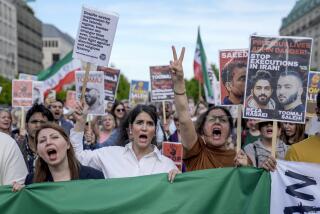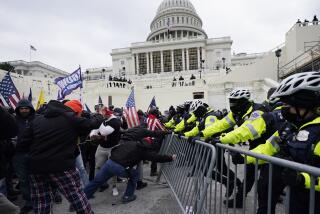Group’s ‘terrorist’ label struck down
LONDON — In a victory for British politicians pushing for regime change in Iran, an appeals tribunal ruled Friday that their government had no authority to ban a leading Iranian opposition group as a terrorist organization.
The ruling, which could help the group gain legal status across Europe, was hailed by proponents of the cause as a significant boost to efforts to organize democratic opposition to the Islamic government in Tehran.
But by legitimizing an organization with a history of deadly attacks in Iran, the British panel’s decision could also undermine Iran’s willingness to cooperate on international anti-terrorism fronts and inject a new stumbling block into negotiations over the Persian Gulf nation’s nuclear program, British officials have warned.
The successful appeal was filed by three dozen members of the British Parliament, many of whom say they hope to empower Iranian opposition groups to peacefully overthrow the government in Tehran.
“This judgment will help Iran build a new country,” said Robin Corbett, chairman of the parliamentary committee that filed the appeal. “Iran will be free.”
The British government said it would probably appeal the ruling.
The case involves the People’s Mujahedin, also known as the Mujahedin Khalq, which over the years has carried out bombings, assassinations and cross-border attacks aimed at unseating Iran’s government. The group maintains that it has abandoned violence and is working to promote democratic transition, but it says it cannot effectively carry out its political activities when it is banned as a terrorist organization.
--
Outlawed in U.S., Europe
The group is outlawed by the U.S. and throughout the European Union. Its lawyers said it hoped to use Friday’s ruling to win reconsideration internationally and step up efforts to topple the Iranian government.
“The fundamental solution to Iran’s crisis is neither foreign military intervention nor appeasement. The solution is democratic change by the Iranian people, and resistance. For this solution to work, all obstacles placed in the path of the resistance must be removed,” said Maryam Rajavi, president-elect of the National Council of Resistance of Iran, an umbrella political opposition group that includes the People’s Mujahedin.
Rajavi spoke to cheering supporters in London by video link from the group’s headquarters in Paris. Dozens of Iranians filled the street outside the courthouse in London after the decision was announced, some weeping, many waving the group’s flag, while organizers handed out sweets.
“Thank you!” the crowd chanted repeatedly.
The British warned in evidence presented to the Proscribed Organizations Appeal Commission that delisting the group could present foreign policy problems for Britain.
“The government adopted a cautious approach in relation to the de-proscription of the People’s Mujahedin Organization of Iran,” Home Office minister Tony McNulty said in a statement.
“I remain convinced that where terrorism is concerned, the rights of the law-abiding majority and the overriding need to protect the public, both in the U.K. and abroad, must lead us to take such a cautious approach,” he said.
The secretary of Iran’s Supreme National Security Council, Saeed Jalili, noted that U.S. officials also regard the group as a terrorist organization, and he said he had been assured that the British government would attempt to retain its prohibition.
“Some of you have seen for yourselves the terrorist activities of this group inside Iran. They have assassinated, they have killed and injured innocent Iranian citizens. This will not at all be a good precedent for Britain,” he said during a visit to London to negotiate Iran’s nuclear dossier with European Union foreign policy chief Javier Solana.
In 2002, the National Council of Resistance provided the first public reports of Iran’s then- secret nuclear program, and some U.S. military officers say the group has provided valuable intelligence about Iran’s leadership and could be a key ally.
A State Department counter-terrorism official said Friday that the Bush administration was not considering removing the People’s Mujahedin from its own terrorist list, where it was placed in 1997.
U.S. officials believe the group, also referred to as the MEK, is capable of committing acts of violence harmful to American interests.
“Many of the MEK’s leaders and operatives remain at large, and the number of at-large MEK operatives who received weapons and bomb-making instruction from Saddam Hussein remains a source of significant concern,” said the official, speaking on condition of anonymity
--
Evidence of change
The British appeals tribunal said there was reasonable evidence that the group had been involved in the 1998 assassination of former Iranian Prisons Organization chief Assadollah Lajevardi and his brother and the planting of a bomb in a Tehran court the same year, among other incidents. But it said it found no evidence that the group had engaged in or claimed responsibility for acts of violence since 2001 or possibly 2002.
“We are satisfied that the only conclusion that a reasonable decision-maker could reach is that the [group’s] policies and activities changed fundamentally in the summer/autumn of 2001,” it said in its ruling.
People’s Mujahedin supporters say the ruling, if it stands on appeal, will allow the group to recover frozen funds, raise new money and organize a more effective political network.
“It will make things enormously different for what’s going on inside Iran. It will be just the boost all those students and everybody else need who are protesting against the regime,” said Masoud Zabeti of the Committee of Anglo-Iranian Lawyers, who helped with the appeal.
Most analysts say the popularity of the People’s Mujahedin is limited in Iran and its prospects of overthrowing the regime are scant.
“I think this ruling would be a substantial boost to the organization, but I don’t think they stand a bat’s chance in hell of being able to unseat the regime,” Patrick Clawson, an Iran specialist with the Washington Institute for Near East Policy, said in a telephone interview.
“But I would also say that is irrelevant to our consideration of whether or not to list them as a terrorist organization,” he said. “If the Mujahedin want to keep on trying to overthrow the regime, that’s their privilege.
“And we should certainly not base our decision on whether we list organizations as a terrorist organization on whether we approve their political goals, or whether their political goals will facilitate or complicate U.S. foreign policy.”
--
Times staff writer Josh Meyer in Washington contributed to this report.
More to Read
Sign up for Essential California
The most important California stories and recommendations in your inbox every morning.
You may occasionally receive promotional content from the Los Angeles Times.










